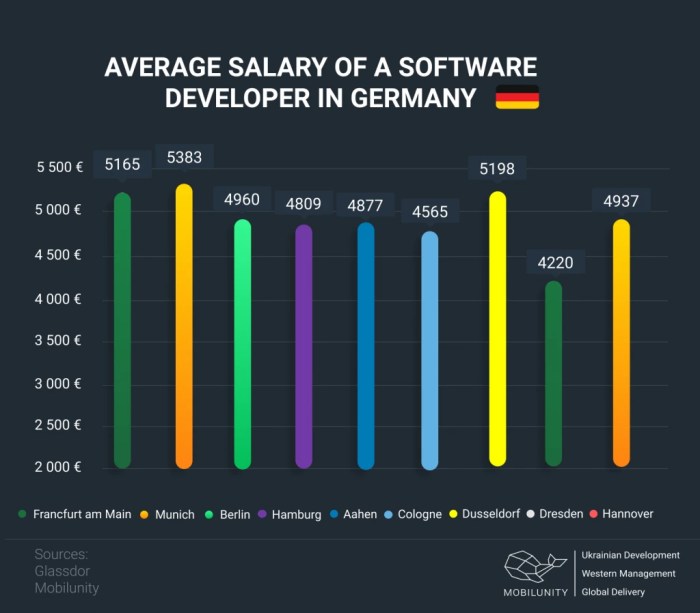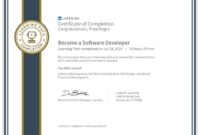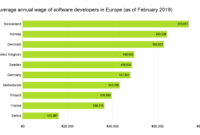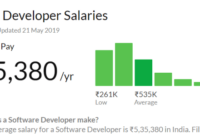How much software developers making germany in * – How much do software developers make in Germany? It’s a question that pops up frequently, especially for those considering a career move or those curious about the tech scene in Europe. Germany boasts a thriving tech industry, and software developers are in high demand, which often translates to attractive salaries and benefits.
But the specific earnings can vary widely depending on factors like experience, location, and the type of development work.
This post will delve into the world of software development salaries in Germany, providing insights into average pay, salary trends, and the factors that influence your earning potential. We’ll also touch upon the cost of living, job market opportunities, and the overall work environment for software developers in Germany.
Salary Ranges for Software Developers in Germany
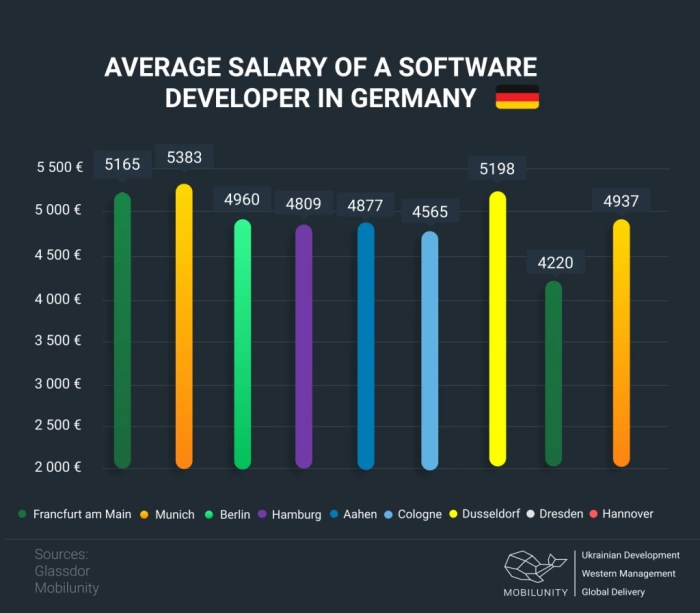
Germany is a hub for technology and innovation, attracting skilled software developers from across the globe. The demand for software developers is high, and salaries reflect this. Let’s delve into the salary ranges for software developers in Germany, considering factors like experience level, specific roles, and location.
Average Salaries by Experience Level
The average salary for software developers in Germany varies based on experience level. Here’s a breakdown:
- Entry-Level:€45,000 – €60,000 per year. Entry-level developers typically have a bachelor’s degree in computer science or a related field and up to two years of experience. They are often involved in smaller projects, gaining valuable experience and honing their skills.
- Mid-Level:€65,000 – €85,000 per year. Mid-level developers have 3 to 5 years of experience and demonstrate proficiency in their chosen technology stack. They are often involved in complex projects and may lead small teams.
- Senior:€90,000 – €120,000+ per year. Senior developers have 5+ years of experience and possess deep technical expertise, leadership qualities, and the ability to mentor junior team members. They are often involved in architecting and designing complex systems.
Salary Ranges for Specific Roles
Salaries for software developers also vary depending on the specific role:
- Web Developers:€50,000 – €90,000 per year. Web developers specialize in creating and maintaining websites and web applications. Their salary range can be influenced by the specific technologies used, such as front-end frameworks (React, Angular, Vue.js) or back-end languages (Python, Java, PHP).
- Mobile Developers:€55,000 – €95,000 per year. Mobile developers create applications for iOS (Swift, Objective-C) and Android (Java, Kotlin) platforms. The demand for mobile developers is consistently high, particularly for those with expertise in cross-platform frameworks like Flutter or React Native.
- Data Scientists:€70,000 – €110,000+ per year. Data scientists use their expertise in statistics, machine learning, and data analysis to extract insights from large datasets. They are highly sought after in industries like finance, healthcare, and e-commerce.
Factors Influencing Salary, How much software developers making germany in *
Several factors contribute to the salary of software developers in Germany:
- Location:Salaries tend to be higher in major tech hubs like Berlin, Munich, and Frankfurt, where the demand for skilled developers is greater.
- Company Size:Larger companies often offer higher salaries and benefits compared to smaller startups.
- Industry:Salaries can vary based on the industry, with tech giants like Google, Amazon, and Microsoft offering competitive compensation packages.
- Skills:In-demand skills, such as cloud computing (AWS, Azure, GCP), artificial intelligence (AI), and cybersecurity, can significantly impact salary.
Salary Trends and Growth Potential
Software development in Germany is a thriving industry with strong demand and competitive salaries. Understanding current salary trends and predicting future growth potential is crucial for developers seeking to make informed career decisions.
Impact of Technological Advancements and Market Demand on Salary Expectations
Technological advancements constantly shape the software development landscape, influencing salary expectations. Emerging technologies like artificial intelligence (AI), cloud computing, and blockchain create new opportunities for skilled developers, driving up demand and potentially leading to higher salaries. For example, AI developers with expertise in machine learning and deep learning are in high demand, commanding premium salaries.
Similarly, cloud computing specialists with certifications in AWS, Azure, or Google Cloud Platform are highly sought after, reflecting the growing adoption of cloud services. Market demand also plays a significant role in salary trends. As businesses increasingly rely on software solutions, the demand for skilled developers continues to rise, leading to competitive salaries and potential for career growth.
Salary Growth Potential for Different Software Development Specializations
Salary growth potential varies across different software development specializations, influenced by factors such as skill set, experience, and industry demand.
- Mobile App Development:Mobile app development is a rapidly growing field, with increasing demand for skilled developers. As more businesses develop mobile apps to reach their target audience, the demand for mobile app developers is expected to remain strong, leading to potential for salary growth.
- Web Development:Web development remains a core specialization in software development, with ongoing demand for skilled professionals. The demand for front-end and back-end developers is expected to continue, offering potential for salary growth.
- Data Science and Machine Learning:Data science and machine learning are emerging fields with significant growth potential. As businesses leverage data analytics and AI to gain insights and make informed decisions, the demand for data scientists and machine learning engineers is expected to rise, leading to potential for substantial salary growth.
Benefits and Compensation Packages
In addition to competitive salaries, software developers in Germany enjoy comprehensive benefits packages that contribute to their overall well-being and financial security. These benefits, often exceeding those found in other countries, reflect the high value placed on employee satisfaction and retention within the German software development industry.
Health Insurance
Germany has a mandatory statutory health insurance system, ensuring comprehensive healthcare coverage for all residents. Software developers, as employees, are typically covered by their employer’s contributions to this system. This provides access to a wide range of medical services, including preventive care, hospitalization, and prescription drugs, with minimal out-of-pocket expenses.
Retirement Plans
German law mandates employer contributions to a statutory pension scheme, known as the “gesetzliche Rentenversicherung,” for all employees. This system provides a basic retirement income, supplementing private savings and other retirement plans. Many companies also offer additional, company-specific pension plans, allowing employees to build a more substantial retirement nest egg.
Paid Time Off
Software developers in Germany are entitled to a minimum of 20 days of paid vacation per year, with many companies offering additional days based on seniority or performance. This generous leave policy allows employees to take time off for personal needs, travel, or simply rest and recharge.
Other Benefits
Beyond the core benefits, many software development companies in Germany offer a range of additional perks, including:
- Flexible working hours: This allows employees to adjust their work schedules to accommodate personal commitments or improve work-life balance.
- Remote work options: Many companies offer remote work arrangements, allowing employees to work from home or other locations, enhancing flexibility and reducing commuting time.
- Company-sponsored events: These events can include team-building activities, social gatherings, or educational workshops, fostering a sense of community and professional development.
- Childcare assistance: Some companies provide childcare subsidies or on-site daycare facilities, easing the burden of childcare expenses for working parents.
- Employee discounts: Companies may offer discounts on products or services, including gym memberships, travel, or insurance, providing cost savings for employees.
Compensation Packages
Beyond base salaries, software developers in Germany often receive attractive compensation packages that can significantly enhance their overall earnings. These packages typically include:
Bonuses
Many companies offer performance-based bonuses, rewarding employees for exceeding expectations or achieving specific goals. These bonuses can be based on individual performance, team performance, or company-wide achievements.
Discover how physics breakthrough could lead new more efficient quantum computers has transformed methods in this topic.
Stock Options
Some companies, particularly startups or rapidly growing firms, may offer stock options as part of their compensation packages. This gives employees the opportunity to participate in the company’s success and share in its future growth.
Performance-Based Incentives
Companies may also offer performance-based incentives, such as salary increases, promotions, or additional benefits, to recognize and reward employees for exceptional contributions.
Company-Specific Differences
The specific benefits and compensation packages offered by different companies in the German software development industry can vary significantly. Factors such as company size, industry sector, and financial performance influence the types and levels of benefits offered. For example, larger, established companies may offer more comprehensive benefits packages, including private health insurance and generous retirement plans.
Startups or smaller companies may offer more flexible work arrangements and stock options as a way to attract and retain talent.
Cost of Living in Germany
Germany, known for its strong economy and high quality of life, also presents a range of living costs that vary significantly depending on the city. While software developers in Germany enjoy competitive salaries, understanding the cost of living is crucial for making informed financial decisions.
This section provides an overview of the cost of living in major German cities, covering essential expenses like housing, transportation, food, and entertainment. Additionally, it examines the impact of these costs on the overall affordability of working as a software developer in Germany and compares the cost of living in Germany to other countries with strong software development industries.
Cost of Living in Major German Cities
The cost of living in major German cities can vary significantly. Cities like Munich and Frankfurt are considered more expensive, while cities like Berlin and Cologne offer a more affordable lifestyle. Here’s a breakdown of the average costs in some major German cities:
- Housing:Housing costs are the most significant expense in most German cities. Munich and Frankfurt have the highest rental prices, while Berlin and Cologne offer more affordable options.
- Munich:Average rent for a one-bedroom apartment in the city center is around €1,500 per month.
- Frankfurt:Average rent for a one-bedroom apartment in the city center is around €1,200 per month.
- Berlin:Average rent for a one-bedroom apartment in the city center is around €800 per month.
- Cologne:Average rent for a one-bedroom apartment in the city center is around €900 per month.
- Transportation:Public transportation in Germany is generally efficient and affordable. Monthly public transportation passes for major cities typically cost between €50 and €100.
- Food:Grocery prices in Germany are generally comparable to other European countries. A weekly grocery bill for a single person can range from €50 to €100.
- Entertainment:Entertainment costs in Germany vary depending on your preferences. Movie tickets, concerts, and cultural events can range from €10 to €50 per person.
Impact of Cost of Living on Affordability
The cost of living in Germany, particularly in major cities, can significantly impact the affordability of working as a software developer. While salaries for software developers are generally high, the cost of housing, especially in cities like Munich and Frankfurt, can eat into a significant portion of their income.
Comparison with Other Countries
Compared to other countries with strong software development industries, such as the United States and the United Kingdom, the cost of living in Germany is generally lower. However, it’s essential to consider the specific city and lifestyle when comparing costs.
For example, while housing costs in major German cities can be comparable to those in major cities in the US, the overall cost of living, including transportation and food, might be lower in Germany.
Job Market and Employment Opportunities
The German software development job market is thriving, driven by the country’s strong economy and increasing digitalization across various sectors. Software developers are highly sought after, making it a promising career path with ample opportunities for growth and advancement.
Demand for Specific Skills and Technologies
The demand for specific skills and technologies within the German software development landscape is constantly evolving. However, certain skills remain consistently in high demand.
- Web Development:Front-end and back-end web development skills are highly sought after, particularly for technologies like HTML, CSS, JavaScript, Python, PHP, and frameworks like React, Angular, and Vue.js.
- Mobile App Development:The increasing use of smartphones and tablets has fueled demand for mobile app developers skilled in languages like Swift (for iOS) and Java/Kotlin (for Android).
- Cloud Computing:As companies increasingly adopt cloud-based solutions, there is a growing demand for developers with expertise in cloud platforms like AWS, Azure, and Google Cloud.
- Data Science and Machine Learning:The rise of big data and artificial intelligence has created a significant demand for developers with skills in data analysis, machine learning algorithms, and data visualization using languages like Python, R, and SQL.
- Cybersecurity:With increasing cyber threats, the demand for cybersecurity professionals with expertise in penetration testing, ethical hacking, and network security is rising.
Major Industries and Companies Hiring Software Developers
Software developers are employed across various industries in Germany. Some of the major industries and companies actively hiring software developers include:
- Automotive:German automotive giants like Volkswagen, BMW, and Daimler are heavily investing in software development to create connected and autonomous vehicles.
- IT and Telecommunications:Companies like SAP, Deutsche Telekom, and T-Systems are major employers of software developers, developing and maintaining software solutions for various industries.
- Finance and Banking:Financial institutions like Deutsche Bank, Commerzbank, and Allianz are increasingly relying on software development for digital banking, financial analysis, and risk management.
- E-commerce and Retail:Online retailers like Zalando, Otto, and Amazon are actively hiring software developers to enhance their online platforms and logistics systems.
- Healthcare:The healthcare industry is undergoing digital transformation, leading to increased demand for software developers to create medical software, telehealth platforms, and data analysis tools.
Job Search Process and Remote Work Opportunities
The job search process for software developers in Germany typically involves:
- Online Job Portals:Popular platforms like Indeed, StepStone, and LinkedIn are excellent resources for finding software development jobs.
- Company Websites:Many companies post their open positions directly on their websites.
- Networking:Attending industry events, conferences, and meetups can provide opportunities to network with potential employers.
- Recruitment Agencies:Specialized recruitment agencies can assist in finding suitable software development roles.
Remote work opportunities are becoming increasingly common in Germany, especially for software developers. Many companies offer fully remote positions or hybrid work arrangements.
Education and Training Requirements
Germany’s software development landscape is dynamic and competitive, demanding a solid foundation in technical skills and a commitment to ongoing learning. The path to becoming a software developer in Germany typically involves a combination of formal education and practical experience.
Formal Education Options
Formal education plays a crucial role in acquiring the necessary theoretical knowledge and practical skills for a successful career in software development. Germany offers a variety of educational pathways, catering to different learning styles and career aspirations.
- Bachelor’s Degree in Computer Science or related fields:A bachelor’s degree is the most common entry point for software development careers. These programs provide a comprehensive understanding of computer science fundamentals, programming languages, software engineering principles, and data structures.
- Vocational Training Programs (Duales System):Germany’s renowned dual system combines practical training at a company with theoretical instruction at a vocational school. This apprenticeship-like approach provides hands-on experience and industry-relevant skills. Software development apprenticeships are available, typically lasting 2-3 years.
- Master’s Degree in Software Engineering or related fields:For aspiring software developers seeking advanced knowledge and specialization, a master’s degree can provide a competitive edge. These programs delve deeper into specific areas like artificial intelligence, cybersecurity, or cloud computing.
Importance of Ongoing Learning and Professional Development
The software development industry is characterized by rapid technological advancements and evolving trends. Continuous learning is crucial for staying relevant and competitive in this dynamic field.
- Online Courses and Bootcamps:Platforms like Coursera, Udemy, and Udacity offer a wide range of online courses and bootcamps covering various software development topics, from foundational programming concepts to advanced frameworks and technologies.
- Professional Certifications:Certifications from reputable organizations like Microsoft, Oracle, and AWS validate specific technical skills and expertise. These certifications can enhance career prospects and demonstrate commitment to professional development.
- Industry Events and Conferences:Attending industry events and conferences provides opportunities to network with peers, learn about emerging technologies, and stay abreast of industry trends.
- Open-Source Contributions:Contributing to open-source projects is an excellent way to gain practical experience, learn from experienced developers, and build a portfolio showcasing technical skills.
Working Conditions and Culture: How Much Software Developers Making Germany In *
Software development in Germany is known for its strong work-life balance and focus on employee well-being. While the work environment can vary depending on the company size and industry, several common characteristics define the German software development culture.
Work Hours and Work-Life Balance
German law mandates a standard 40-hour workweek, with overtime typically compensated. Many companies also encourage employees to take their full vacation time, promoting a healthy separation between work and personal life. This emphasis on work-life balance is reflected in the prevalence of flexible work arrangements, such as remote work options and flexible schedules, allowing developers to manage their time effectively.
Company Culture and Team Dynamics
German software development companies often foster a collaborative and inclusive work environment. Teams are typically composed of diverse individuals with a range of skill sets, encouraging knowledge sharing and mutual support. Open communication is valued, and hierarchical structures are generally less pronounced compared to other countries, promoting a more egalitarian work culture.
Professional Culture and Values
The German software development industry values professionalism, competence, and a focus on quality. Developers are expected to be highly skilled and knowledgeable in their field, and there is a strong emphasis on continuous learning and professional development. Furthermore, German developers often prioritize meticulousness and attention to detail, ensuring the highest standards in their work.
This focus on quality and efficiency is reflected in the German software industry’s reputation for producing reliable and well-engineered software solutions.

